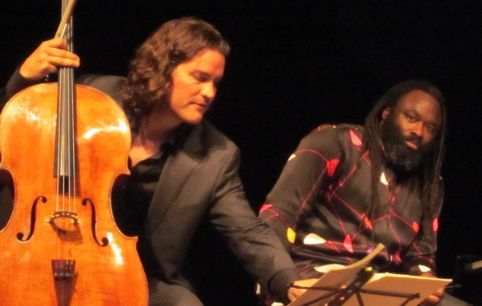|
Symphony
FROM THE NEW WORLD TO THE OLD WORLD
by Peter Lert
Saturday, June 14, 2025
Chamber
MC2 DUO RECITAL CLOSES 222'S SEASON
by Terry McNeill
Saturday, June 14, 2025
Choral and Vocal
CANTIAMO SONOMA'S LUSCIOUS A CAPELLA SINGING IN SEASON ENDING CONCERT
by Pamela Hicks Gailey
Sunday, June 8, 2025
Symphony
SRS SEASON ENDS WITH RESOUNDING TA-TA-TA-BANG
by Terry McNeill
Sunday, June 1, 2025
Symphony
YOUTHFUL VIRTUOSITY ON DISPLAY AT USO'S MAY CONCERTS
by Peter Lert
Saturday, May 17, 2025
Symphony
MYSTICAL PLANETS AND LIVELY GERSHWIN ORTIZ AT FINAL SRS CONCERT
by Peter Lert
Sunday, May 4, 2025
Symphony
VSO'S CONCERT MUSIC OF TIME, MUSIC OF PLACE
by Peter Lert
Sunday, April 27, 2025
VOCAL ELEGANCE AND FIRE AT THE 222'S RECITAL APRIL 26
by Pamela Hicks Gailey
Saturday, April 26, 2025
CANTIAMO SONOMA SINGS AN INSPIRED GOOD FRIDAY MOZART REQUIEM CONCERT
by Pamela Hicks Gailey
Friday, April 18, 2025
DRAMATIC SHOSTAKOVICH SYMPHONY CLOSES PHILHARMONIC'S 25TH SEASON
by Terry McNeill
Sunday, April 13, 2025
|
 |
 Cellist Zuill Bailey and Pianist Awadagin Pratt March 29 in Napa's Jarvis Conservatory |
GRANITIC SONATAS AND RARE SONG TRANSCRIPTIONS IN ALL BRAHMS NAPA VALLEY SYMPHONY BENEFIT RECITAL
by Terry McNeill
Tuesday, March 29, 2011
Concerts devoted solely to the music of Brahms are not that rare, and Sonoma County had one several years ago in the glorious “Norma Brown and Friends” event at SRJC. But an all-Brahms concert featuring just his cello music is novel, and a splendid example occurred March 29 in Napa’s Jarvis Conservatory.
In a fund raiser benefiting the Napa Valley Symphony, cellist Zuill Bailey joined colleague Awadagin Pratt in the two big Sonatas and several of the Hamburg master’s songs in cello transcriptions. And audience of 80 heard exceptional artistry accompanied by Mr. Bailey’s witty and cogent descriptions of Brahms’ complex life and prickly personality. There was no printed program and the cellist played from score all evening, seldom referring to the music and instead looking at his instrument or playing long stretches with closed eyes.
The lovely song Sommerfäden, Op. 72, No. 2, began the concert and immediately established that the instrumental balances were exemplary and the cello sound rich. The hall’s piano was less than professional, the lower tenor and bass registers indistinct and wooden and the treble lacked color. Mr. Pratt pushed the instrument hard all evening, particularly so in the first Brahms Sonata in E Minor, Op. 38. Written with thicker textures than the two Mendelssohn cello Sonatas, and far outstripping the contemporary Rubinstein and Servais works, the E Minor benefited by Mr. Bailey’s sonorous tone and deft decrescendos into the lower registers. In the nostalgic Menuetto Mr. Pratt played the opening four notes and had a beguiling touch in the soft passages, mirroring the cellist’s bow which occasionally would linger longingly at the end of a phrase.
The fugal Allegro was played powerfully, Mr. Pratt driving the tempo and providing sharp accents, easily heard with the hall’s limited reverberation and Mr. Bailey's musical line in a low range. The coda was played very fast and was emphatically exciting.
Prior to the famous F Major Sonata the duo played another transcription from a Brahms song, with no title stated but perfectly in the style of a Mendelssohn Song Without Words, such as the fetching D Major, Op.109. It was a captivating reading. The monumental Sonata that followed was packed with bravura playing. Just after the opening of the Allegro Vivace Mr. Pratt’s figurations at the piano enhanced some inner voices and Mr. Bailey’s vibrato became wider, and the tone had a nasal character that was clearly desired by the cellist and not at all unpleasant. The runs in both instruments were clear and the piano’s damper pedal captured the last word. The great Adagio was played with elegant sentiment but without a note of sentimentality. The descending-ascending pizzicatos in the cello were adroit and the movement’s tender ending chastely played.
The final two movements had the stamp of Mr. Pratt’s insistent rhythms and again perfect balances, even in the frequent key modulations of the Allegro molto. Intonation was never a problem for Mr. Bailey and the majesty of the duo’s conception and virtuosic performance generated a standing ovation.
The encores, each announced by Mr. Bailey, were another song transcription (perhaps the Liebestreu, Op. 3, No. 1?) with its two Mendelssohnian concluding chords, and the tender Brahms Lullaby, Op. 49, No. 4. Here as throughout this radiant recital instrumental display never got in the way of romantic refinement.
Napa Valley Symphony Executive Director Richard Aldag presided over the festivities that included a pre-music reception and a lavish post-music dinner with the artists.
|

